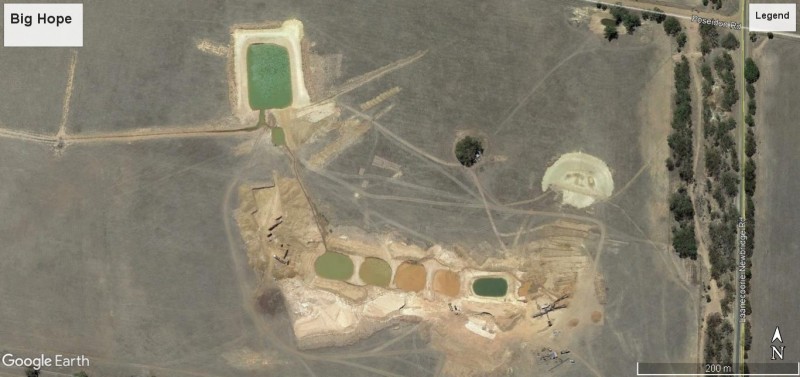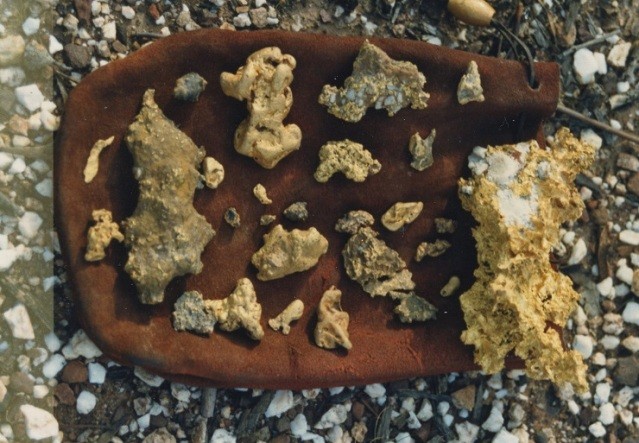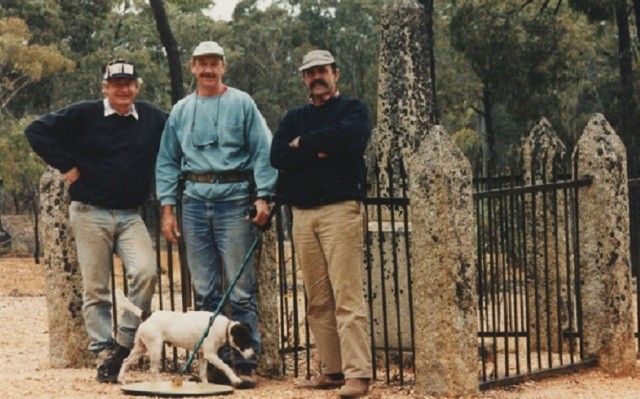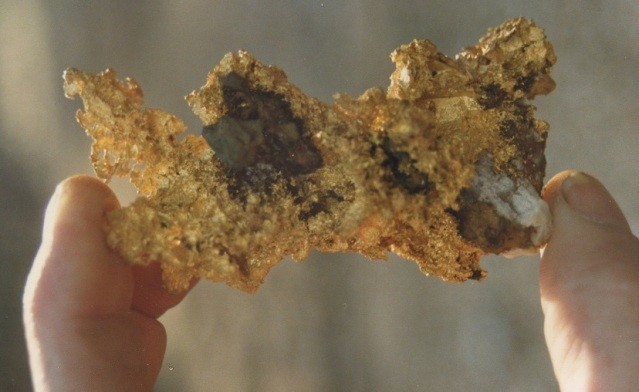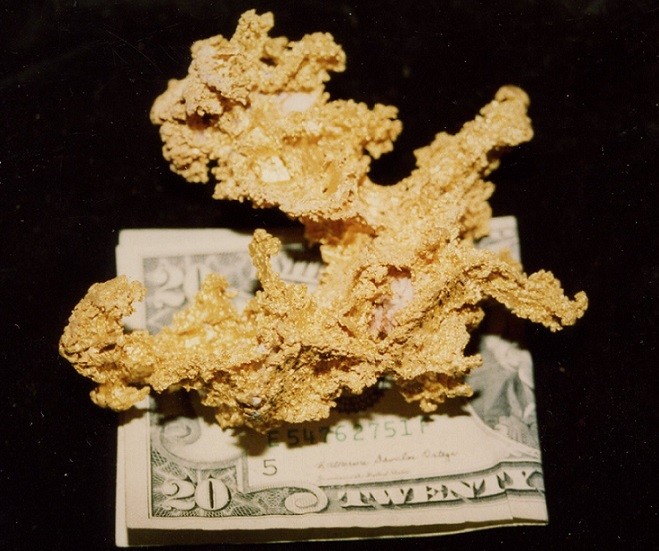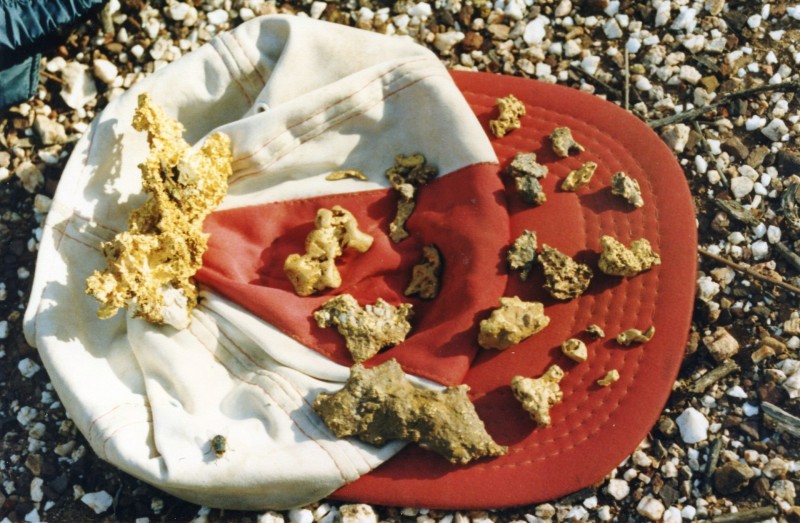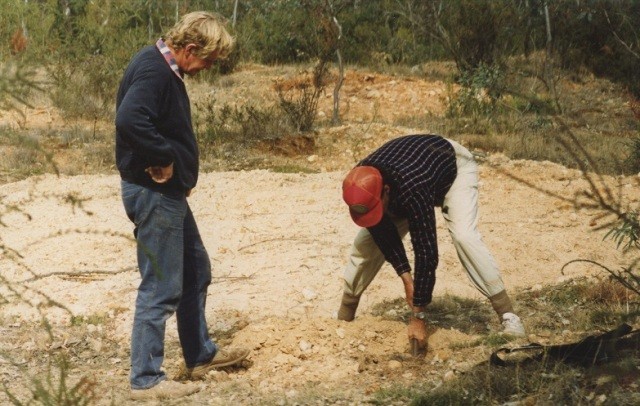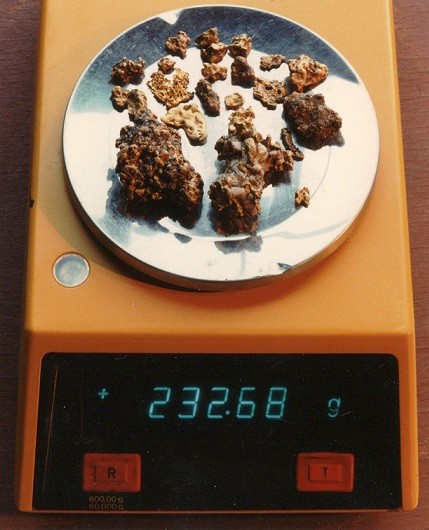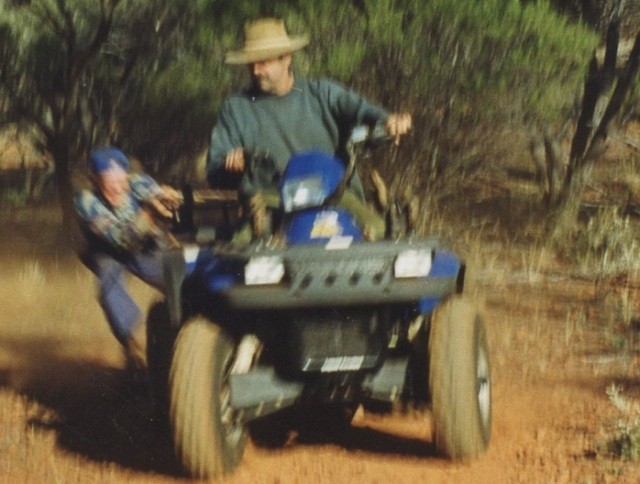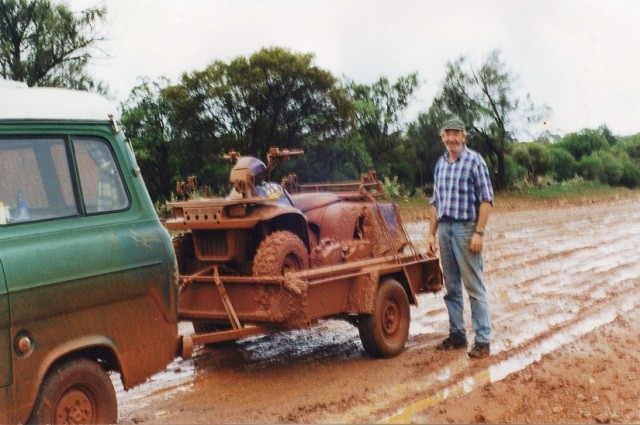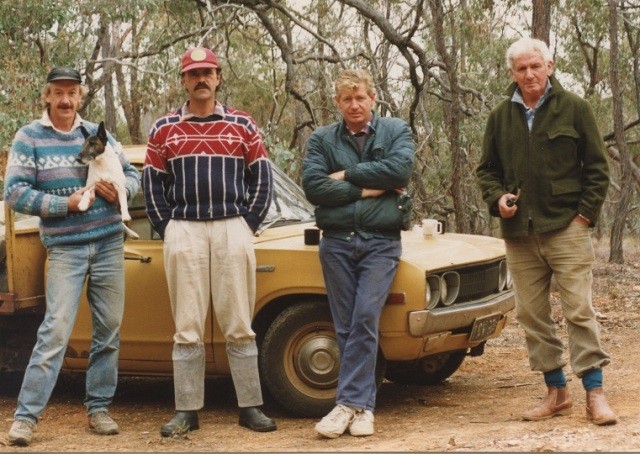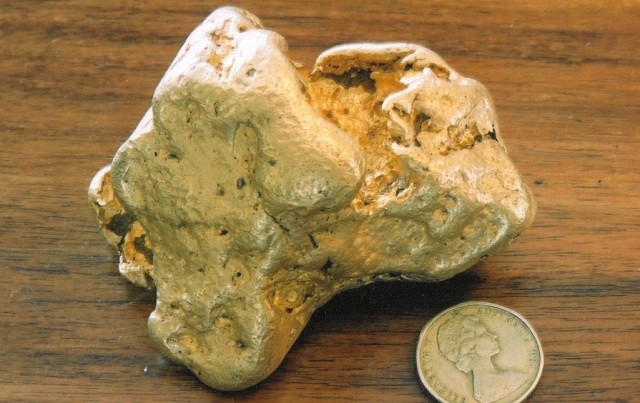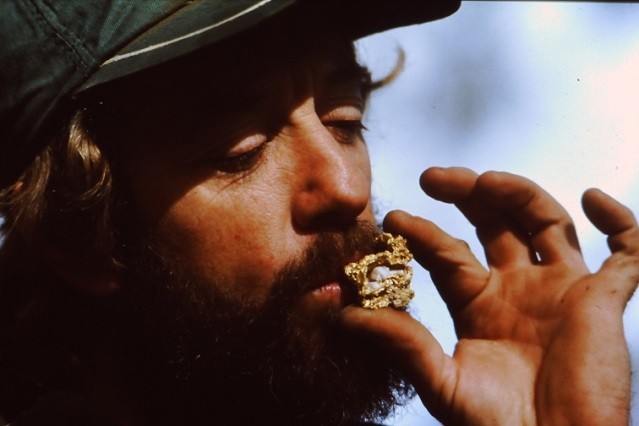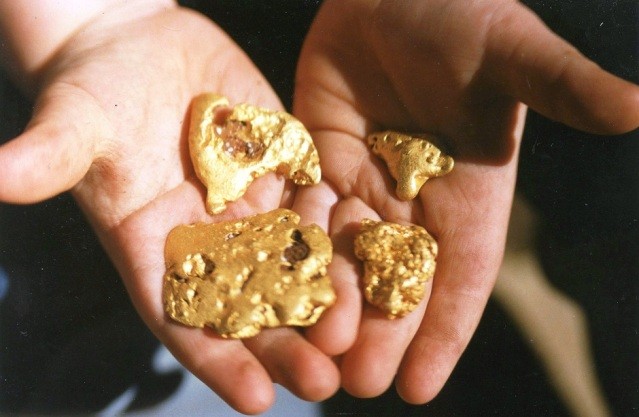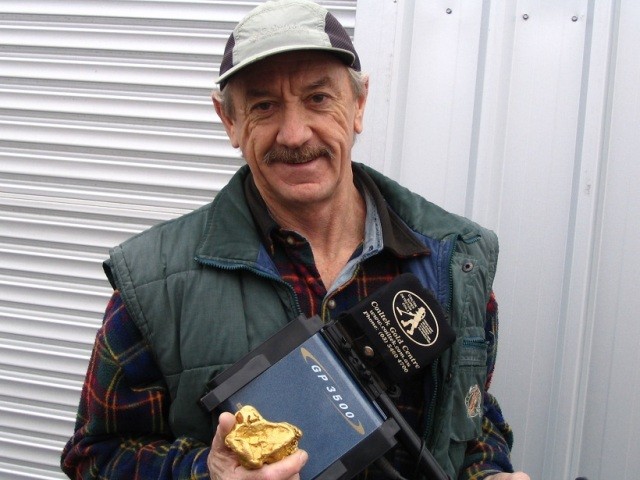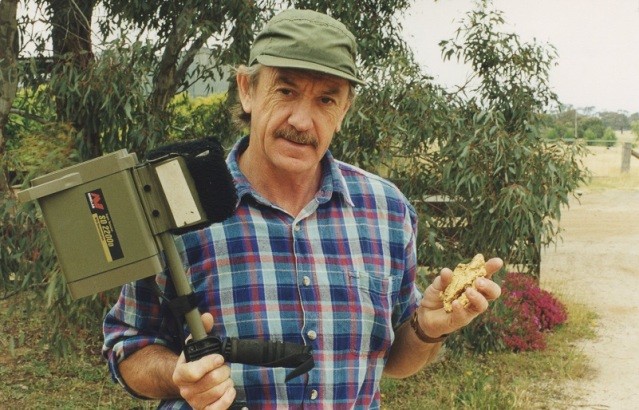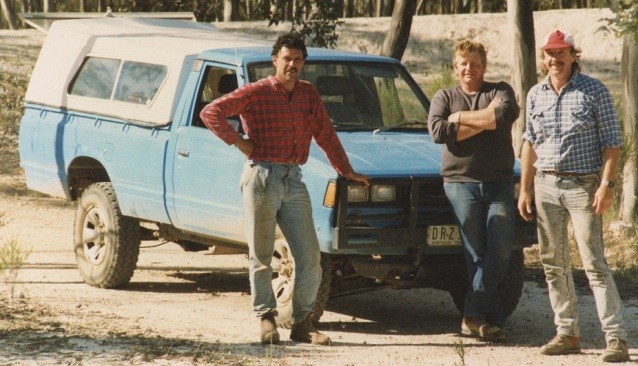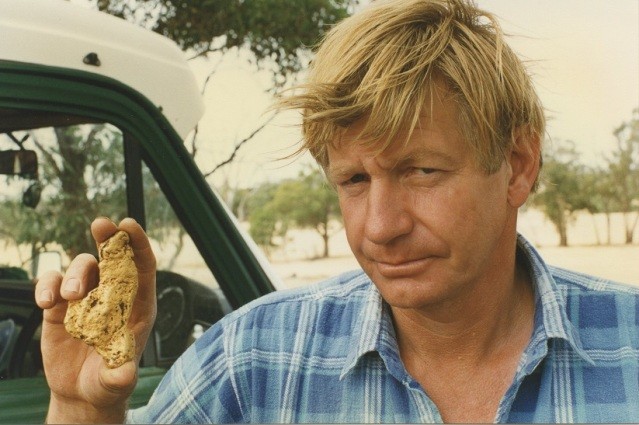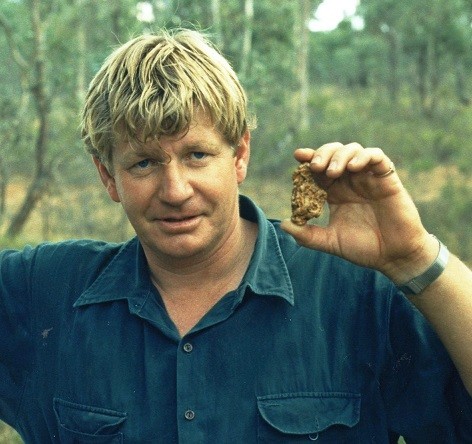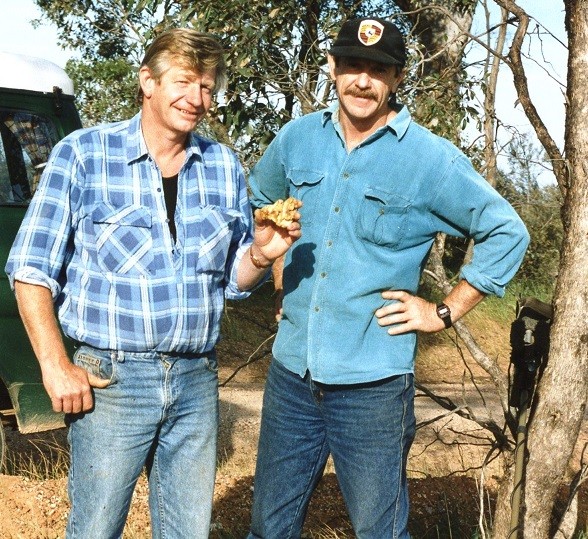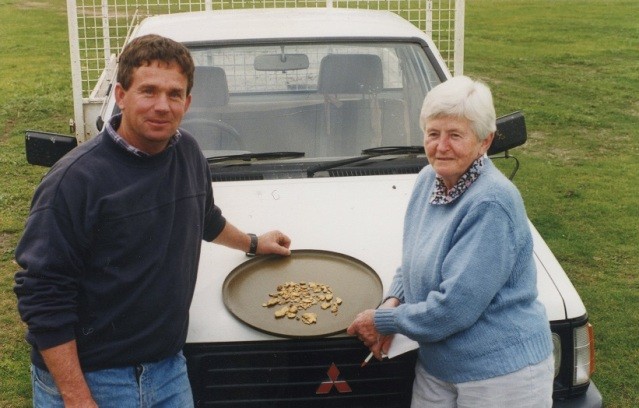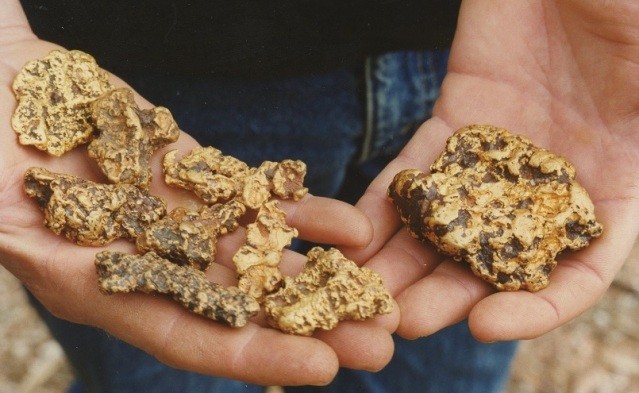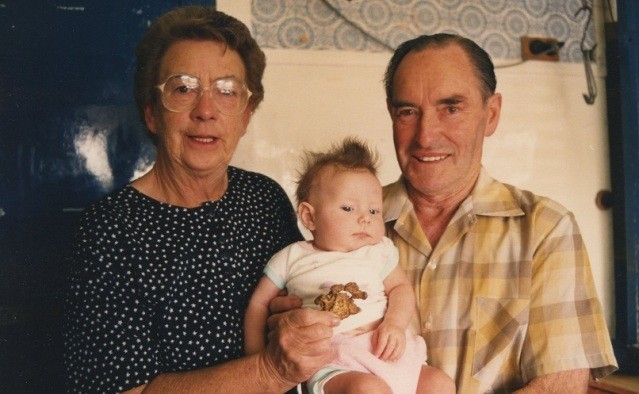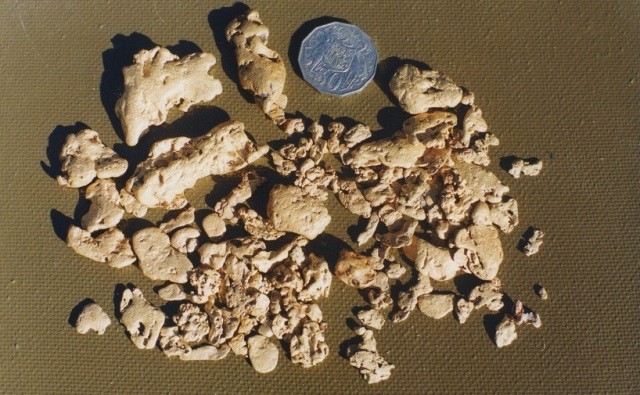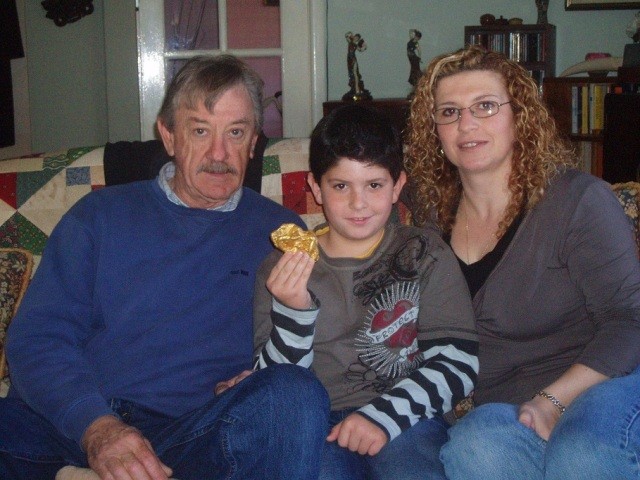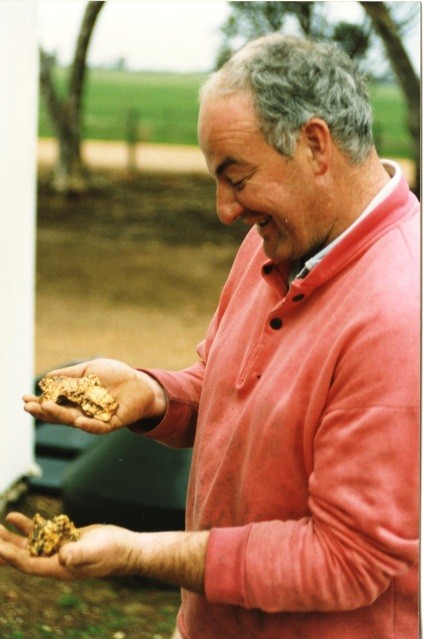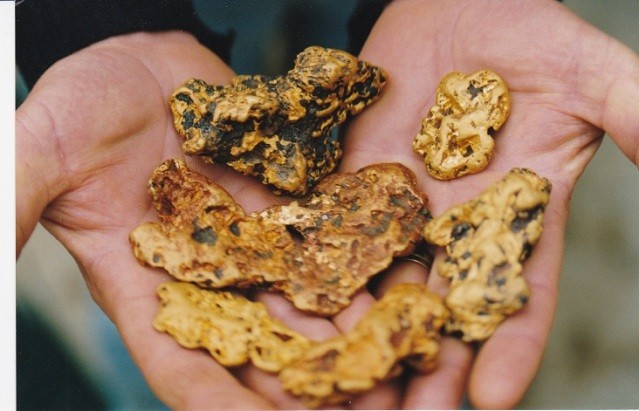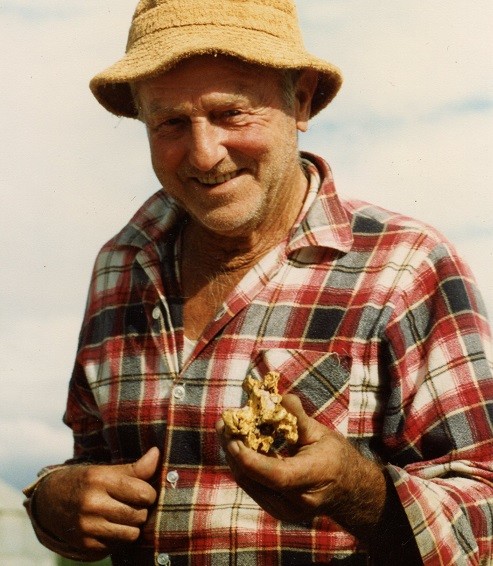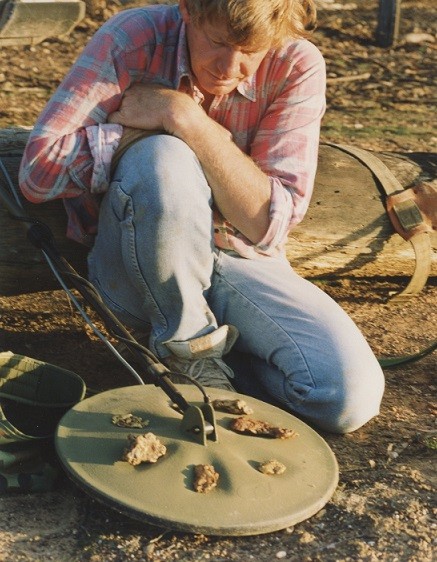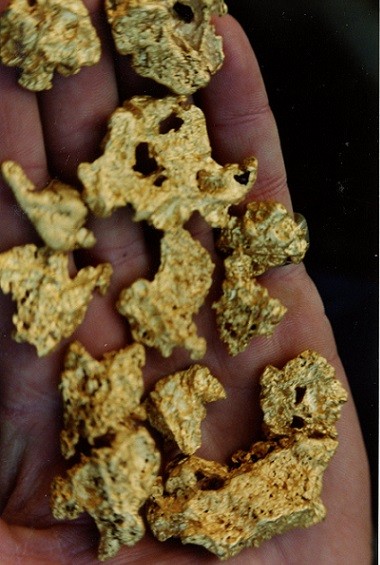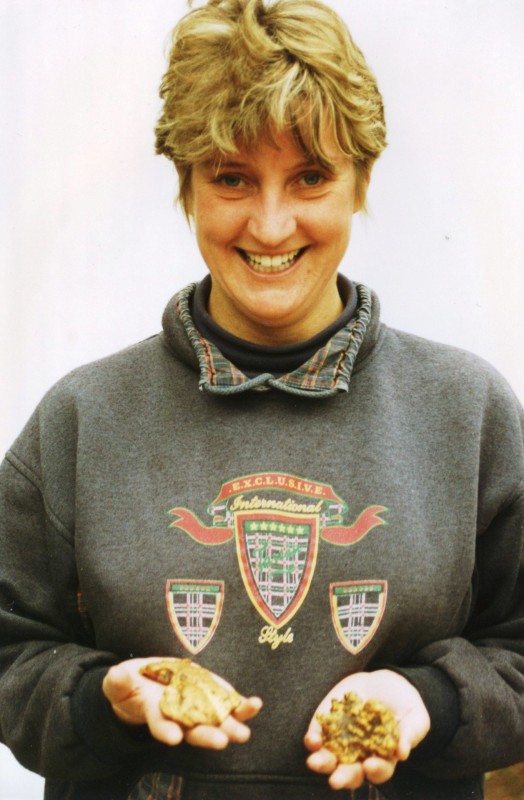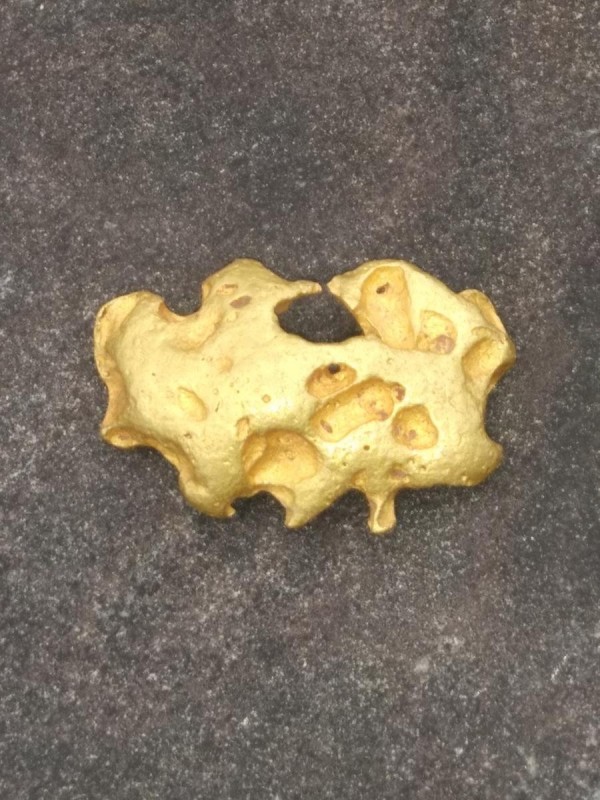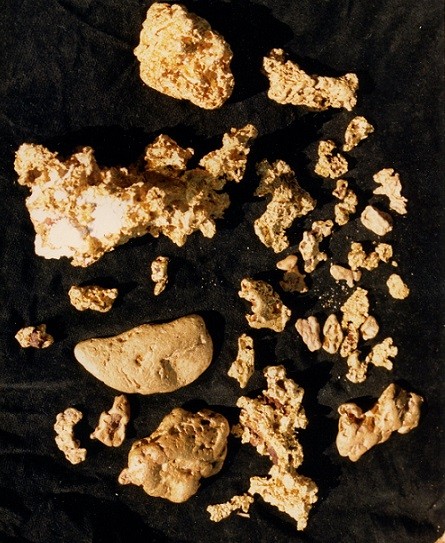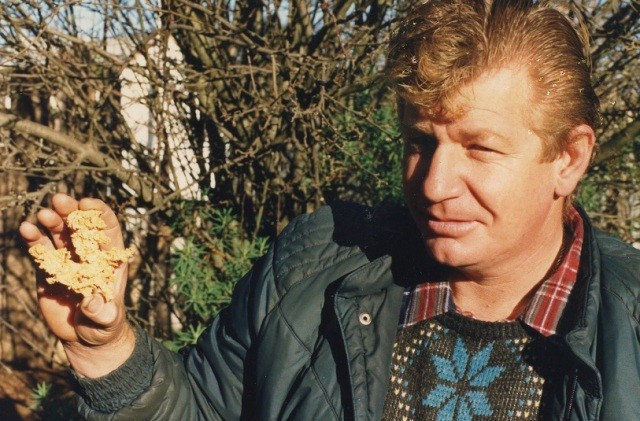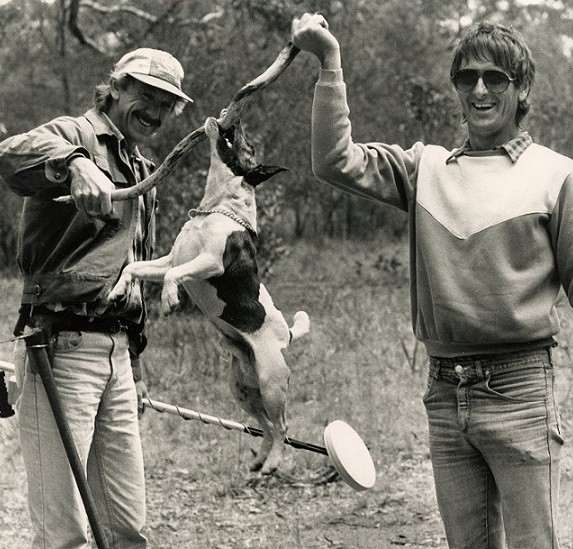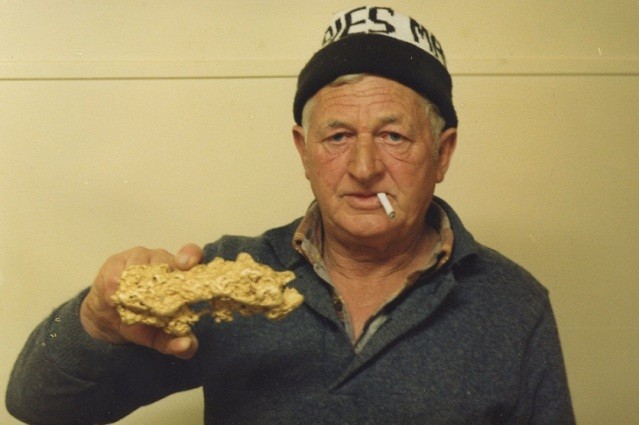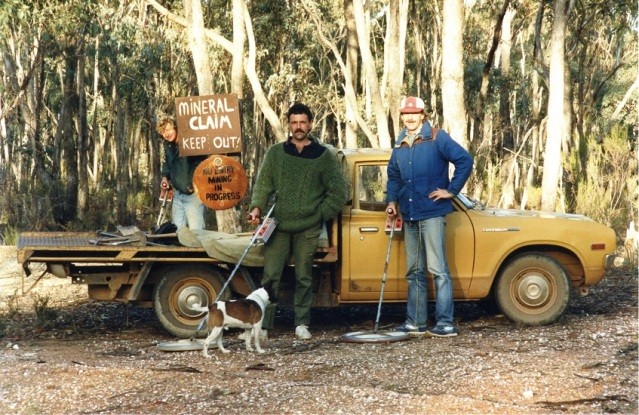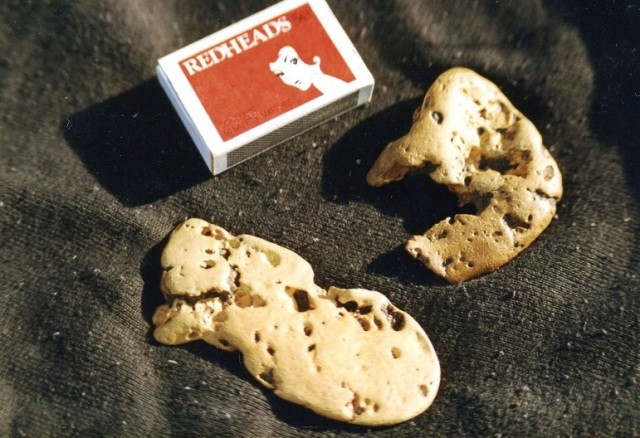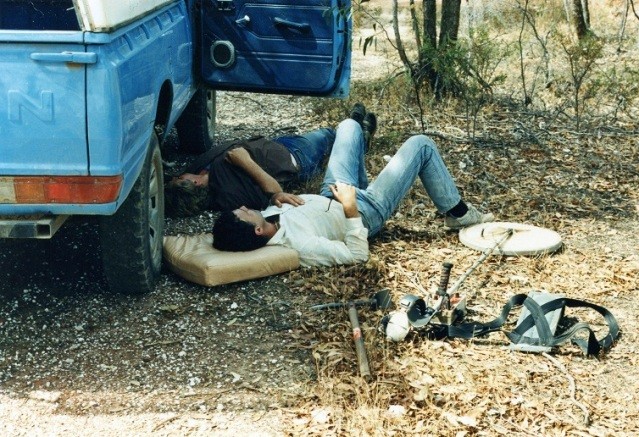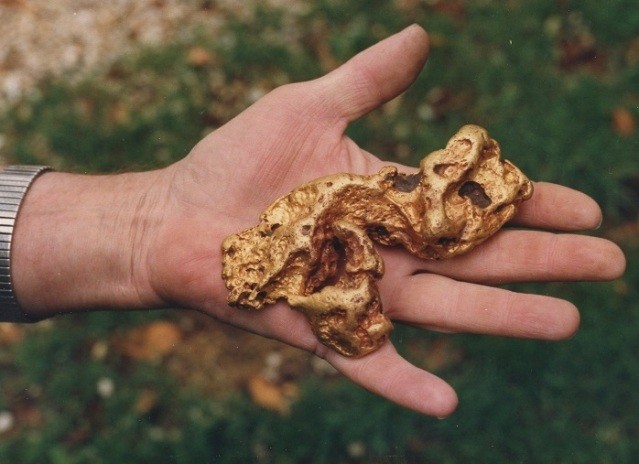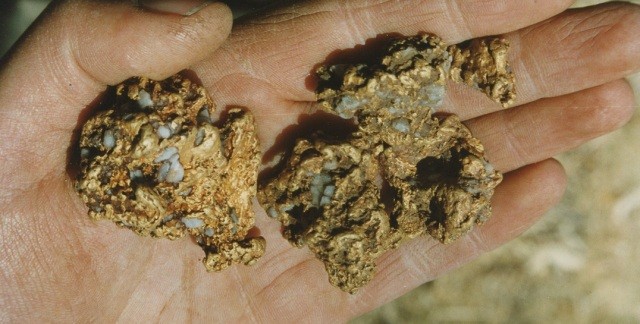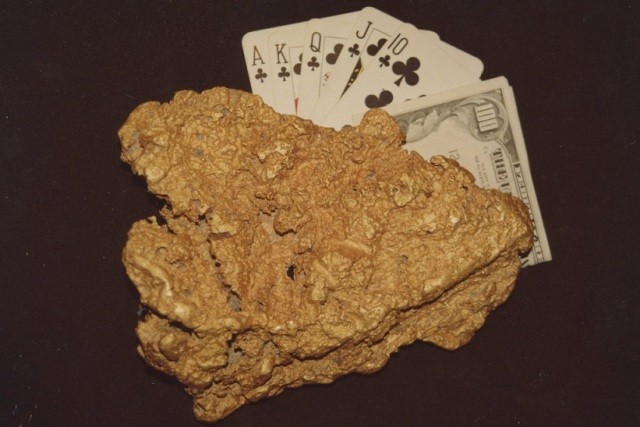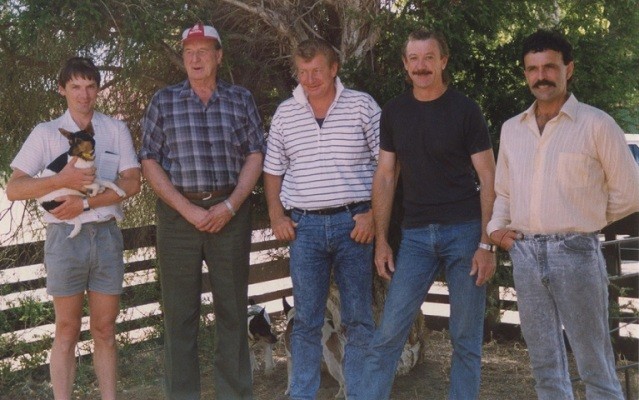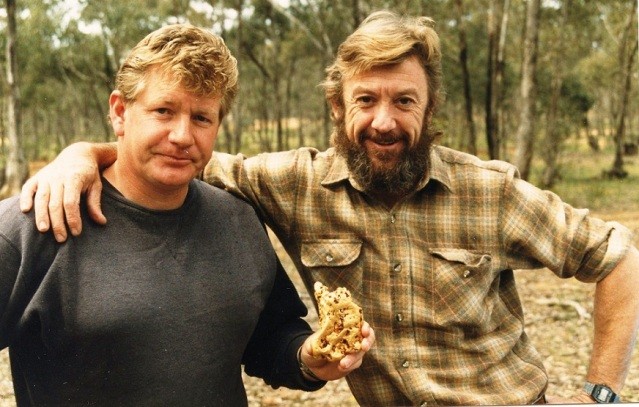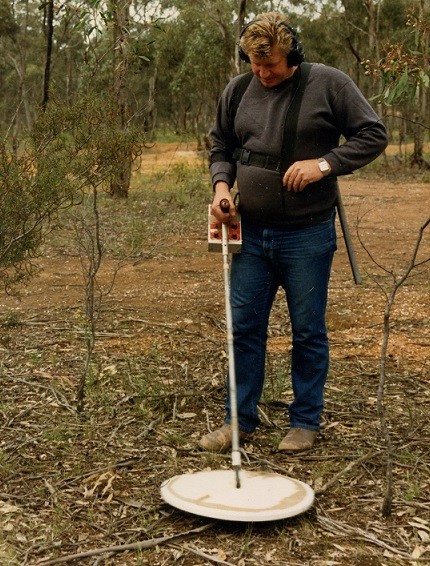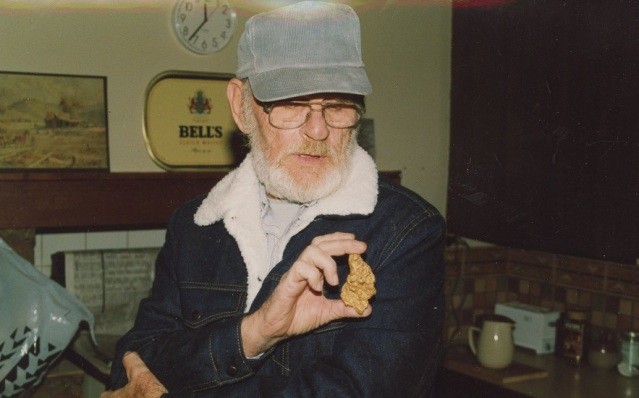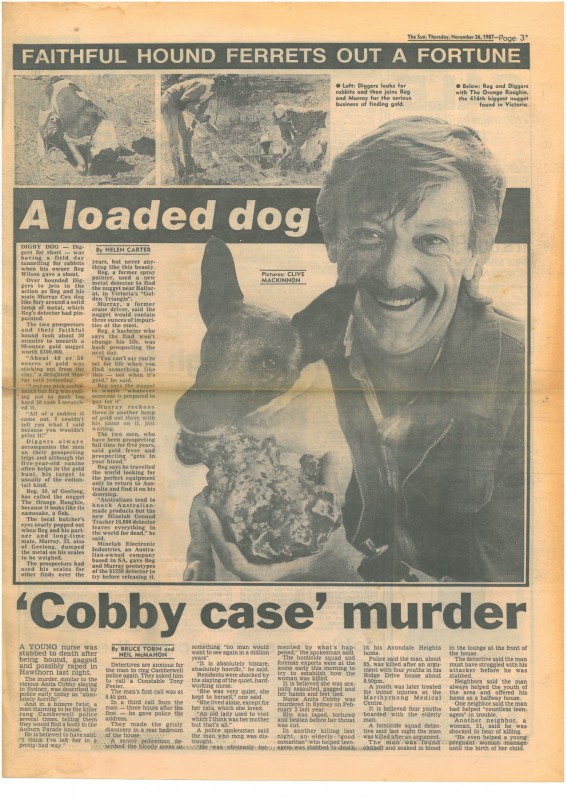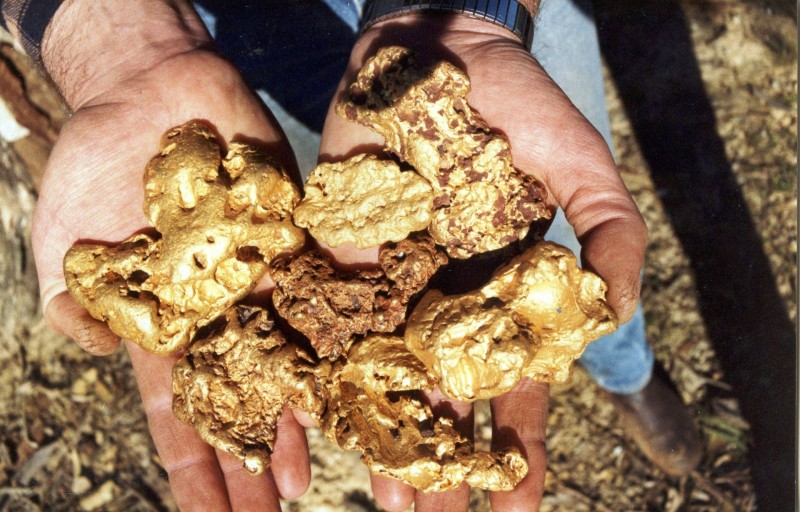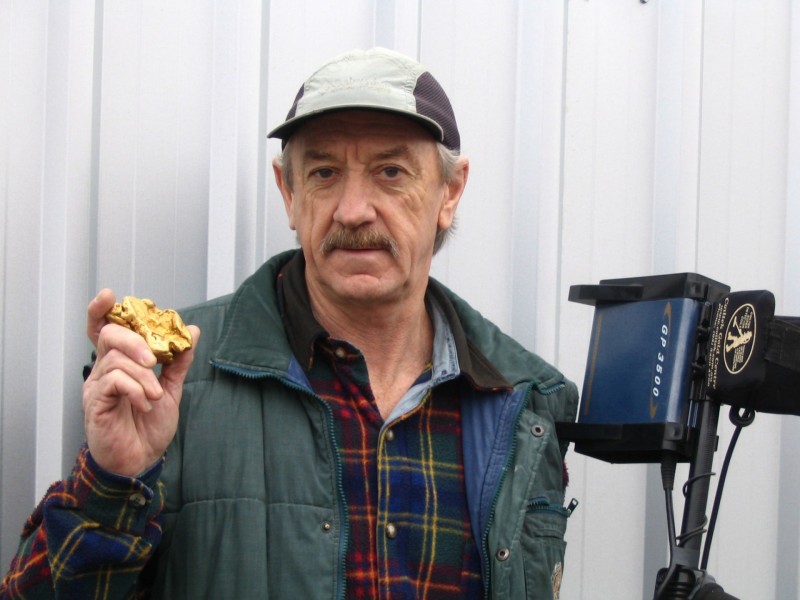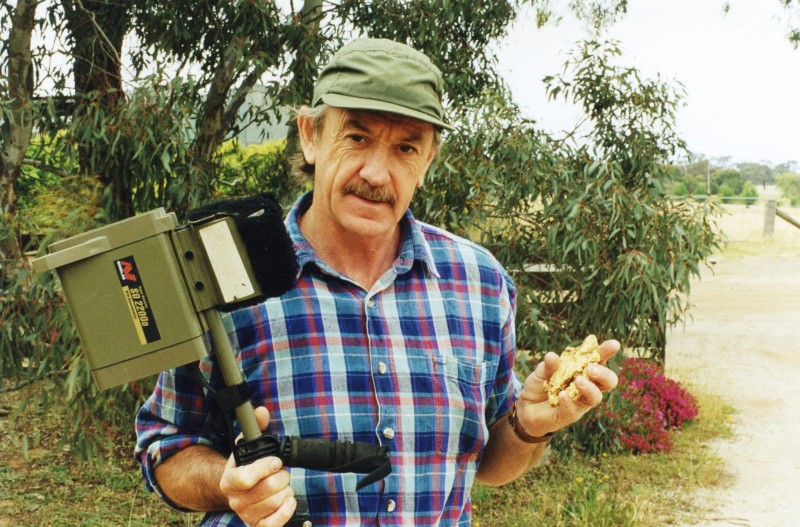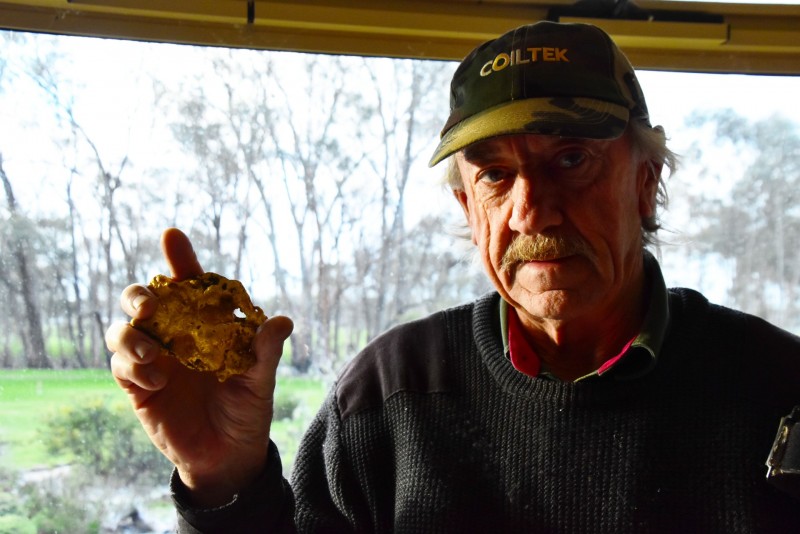-
Posts
576 -
Joined
-
Last visited
Content Type
Forums
Detector Prospector Home
Detector Database
Downloads
Everything posted by jrbeatty
-
Thanks Mitchel. Reg writes: "About 40 ozs from Tarnagulla and Poseidon. The red bit is from Harris's property. I missed the monster patch by a stones throw" The 'Monster Patch" he refers to was later discovered by moonlighters and has now developed into a large scale alluvial operation called the "Big Hope" This is an alluvial "lead" that the old timers missed, and is producing some very large nuggets. In Victoria, deep leads are buried valleys of Tertiary age. It started as an extremely rich surface patch (missed by Reg) below the dry dam on the right and is projected to run to the left of the green dam, and will eventually cross the Poseidon road at the top. It will then join the older worked leads to the north. "The one that got away" eh! Reg? I'd hate to know how much gold we have all just missed!
-
Rough gold from Sparks Gully Moliagul: Spectacular 20 oz nugget from Moliagul (held by Ian in an earlier image) purchased by "Rattlesnake" John: Reg writes: "The Beagle boys with Zig the wonder dog (so called as it was a wonder no one had shot him!) at the 'Welcome Stranger" monument, Moliagul. The coil shown here was my Lance Hewitt special. Just brilliant!" The Monument marks the spot where, in 1869, the worlds largest nugget (specimen) was discovered by Cornishmen John Deason and Richard Oates. It had a calculated refined weight of 3,123 oz (214.1 lbs) Immediately below the Monument in Bakers gully, John detected a 6 oz colour. The late Jim Stewart was with him at the time, and had another photograph with them posing with it at the monument. I found a pretty 6 grammer there many years ago: A contemporary image showing the discoverers and their families, taken some time after the discovery 0f the welcome stranger using a lump of quartz. Sadly, no actual images of the nugget were taken before it was cut up and melted into sovereigns. Image: Wikimedia
-
Giddiup: Always junk around, but the trick is to avoid digging "old" deep ground and only detect "new" ie, unworked ground. You might still hit gold in old ground, but you're certainly going to dig a lot of deep junk. Sometimes it's hard to tell the difference. John digs rubbish just off Nuggety gully road, Talbot. Didn't realize he was on old ground
-
I'll bet those old boys left one for you somewhere KJW. With the hours you put in swinging, it's only a matter of time! Edit: "Opss....I should say.....a one ounce "colour" " Cheeky bugger!
-
Hey Kiwi! They all add up.
-
On with the show. Dunolly gold: 14 ozs north of Dunolly 39ozs Berlin Rush Detail of above: Reg writes: "The late "Kiwi" Russel Barker (on right) detected a 250 oz nugget at Clovers gully, Dunolly. John, Ian, and I worked with him for a time in 89-90. The nugget had been heard by John but he had dismissed it as a junk signal" 13 0z Wedderburn west: On a lighter note: The late Jimmy Stewart about to be tipped off the coil sled by manic biker John Hider Smith. WA goldfields late 90's: Reg Wilson. Rain in the west, late 90's He still uses that old green Transit van for his prospecting vehicle : This one appeared in "Gold Gem and Treasure" magazine many years ago, in a story Reg wrote on Indian gold mining:
-
Hey Mop! I only meant the biggies are gone from the areas worked by the prototype SD's. Make no mistake, the damn things are still hiding elsewhere!!!
-
Ok. The grazing and cropping properties in Victoria are mainly freehold and in many cases have been handed down through the generations since original settlement. How did they come by it? To grossly oversimplify the process, basically they selected it and were then granted title providing they fenced it. However, freehold title does not entitle the owner to the mineral wealth beneath or on the ground and, consequently, many parts of the state are under different mining exploration licenses. The arrangements made between freehold owners and small prospectors and detector operators are largely unaffected by these bigger EL's and are organised by mutual agreement. Under Victorian state regulations, the holder of a Miners Right is entitled to prospect on government land and keep what they find. This was a right earned long ago in the wake of the battle of the Eureka Stockade at Ballarat in 1854. This "Right" has since been eroded considerably by "green" pressure and, increasingly, much government land is now closed to detecting, and indeed, large scale mining. To sum up: The freehold land owner does not own the gold, and has the authority to deny entry to detector operators (but not EL holders) All our freehold detecting is carried out with permission, and usually under a deal.
-
Thanks Mop. Interesting how later technology only finds small bits on the areas worked with the proto's. The biggies are gone.
-
It's a quiet relaxing Sunday so I might as well keep posting. Truth be told, I'm enjoying it far more the second time around and the layout is now less chaotic. Thank you to everyone for your encouragement. The "Beagle Boys" with Ian's "7 ouncer" so called because he bought it with 7 ozs of gold: Ian with an 8oz piece from Lucknow lead at Maryborough: Ian and Reg: 23 oz nugget from Garibaldi. Notice the Porsche cap. Reg has had a couple of 911's over time. Reg said: "Ian looks a bit disappointed that this 11oz bit from Garibaldi wasn't bigger. It sounded bigger" 38 oz nugget from Creswick. Reg, Stella Garcia and son Hayden: The Laidlers (now deceased) and grandchild, with 6oz colour Reg detected on their Corindhap property. John Cain and his mum. Ray Daniel and Reg detected 20 ozs on their property at Baringhup West. closeup of above: A 20 ounce nugget and the better bits from a virgin patch just south of Stirling rush Wedderburn. There were many smaller bits as well, for a total of about 50 ozs:
-
Mitchel: It's probably fair to say that in the beginning, the SD prototypes were a better kept secret than "Enigma" during WW2. Later, word began to leak out. Bruce used to camouflage the prototypes in various boxes, the Goldseeker 15000 was common and the blue Whites box as well. Immediately after the SD2000 was released, I obtained a late model prototype (from tester Jim Stewart) which had been used by Pieter Heydelaar. This was housed in a red plastic Minelab "Goldstriker" box and was faulty. I was able to repair it and used it for awhile before it was returned to Bruce Candy. In my opinion it was superior in performance to the 2000. All these prototypes had a coded startup sequence in case they fell into the wrong hands. Reg sometimes ruminates on writing a book about it called "Unfair Advantage" I hope he does!
-
Thanks for that Steve. I'm not blowing smoke here but frankly, I doubt there's a better run and more comprehensive gold forum anywhere, so this is the logical place to post it. Thank you very much for hosting it! I sometimes wish I, too, could return a few decades. I certainly wouldn't have been chasing coins in the 70's - Interestingly, some of the sites the Beagle Boys detected were quite well known by then and much gold had already been detected. Their ability to recover more was due to the huge "unfair advantage" the Minelab SD prototypes presented. This meant that the larger deeper pieces could be readily recovered. As you point out, it seems unlikely that such an opportunity will present itself again, with newer detector technology today only presenting comparatively minor advantages over their predecessors - but we live in hope -- John and Reg told me the trick back then was to locate patches where big gold had already been recovered with existing detectors - and clean up. Nonetheless, much of the gold in this album was detected by standard detector technology, following some brilliant prospecting and thorough research.
-
Colours from Poseidon. Shed from the Woolshed Reef. Notice all the bits had a distinctive perforated appearance. The late Roy Harris with a 14 oz piece detected by the Beagle Boys from Roy's property at Poseidon. Roy kept this piece as his share of the gold recovered: 60 odd ozs from John Condins paddock, Wehla, detected by Ian and Reg: John Condin looking happy, as Ian and Reg paid him 20% of the 60 oz recovered from his property Condin paddock gold. Reg said: "Ian with some of the better slugs that we found with our brand new SD2000's on the first day we used them. Between the two of us we pulled over 60 ozs in 2 days. What a way to break in our machines!" John Condins wife Lynne with some of the gold:
-
Mitchel: I'll get Reg to answer the first part of your question. He's currently at the Laanecoorie gold bash in central Victoria, and when I phoned him last night he was having a glass (or two) of his famous home brew single malt whisky with Howard, the QED detector inventor My first find? I started gold detecting comparatively late. I used to chase old coins with a Whites 5000D in the 70's. Like Goldenoldie, it wasn't until I saw that iconic image of Reg and his dog chomping on the "Roughie" (featuring in an ad for a Minelab GT 16000) that I bought one in Wedderburn from the late Barrie Johnson. I had met John Hider Smith earlier and he allowed me to detect on one of his Miners Right Claim's in the Beggary Hills. Little did I know that he and Ian had already combed it with those strange looking Goldseeker 15000's with the roughly made big coils (It wasn't till much later that I discovered they were SD proto's and could penetrate almost twice as deep as any then current detector) I remember I fired up my new machine and within minutes had a signal which turned out to be a pretty 1 oz colour. I still have it: Later on, when I excitedly showed them what I had found, the look on John and Ian's faces was priceless - - - More soon - - -
-
Thanks Dave and Paul. I'm just basking in reflected glory here. Reg's lovely wife Jannine did all the slow tedious image scanning and Reg is a self confessed computer image upload agrophobe, hence my role. Ian with 20oz specimen, Moliagul: Blue quartz specimens, northeast of Wedderburn. Weight forgotten. On a personal note, of all Reg's gold, these lovely specimen pieces are easily my favourites. This image copy has almost lost the beautiful blue colour. 30 ozs Havelock and Maryborough: John H S and Ian Jacques: Stinking hot summer day. Prototype SD and battery backpack on ground "Beagle Boys" Ian, John and Reg (with SD prototypes) keeping out. 35 ounces from Kingower: the late Timmy Raven with a 60 oz piece from "Ravens Patch" Longbush: 8 oz and 5 oz "Ravens patch" longbush: Reg, foxy Digby and detecting partner Murray Cox. Mid 80's (photo: Sun Herald)
-
Mitchel: Thank you for the topic offer and your encouragement for the idea of reposting the album here on Steves forum. I'll post more soon!
-
Reg Wilson is a bit of a legend in Australian detecting circles and has kept a comprehensive photo collection of his finds over 4 or 5 decades. Now everyone likes gold images and stories - and there are plenty here! I've been offered existing topics to post on, but I believe the topic deserves its own thread to do it full justice. All images are those of Reg Wilson unless otherwise attributed. The album consists of hundreds of photographs of not only gold, but many gold detecting industry characters, some of whom are no longer with us, but who all contributed in their own unique ways to the great gold chase we still enjoy today. Firstly, a bit of background. Reg first shot to international fame with the finding of this 98 ounce piece which he named the "Orange Roughie" in 1987, decades later to be fraudulently rebirthed as the "Washington Nugget" By no means his first find, Reg was already a successful detector operator and at the time was testing a prototype GT 16000 for Minelab's wizz kid engineer Bruce Candy: Photo: Australian Sun Herald L to R: Bruce Candy, the late Doug Robertson, Ian Jacques, Reg, John Hider Smith. Reg recalled: "The man standing next to Bruce Candy is the late Doug Robertson, who with his brother Bruce worked the aluvials below the famous and fabulously rich Matrix reef at McIntyres. They had an old Matilda tank with a blade attached to clear Mallee scrub. Between them they had a wealth of knowledge of the northern Victorian gold fields. (Doug's name may have been Robinson. Memory is a bit foggy)" Ian, Reg and John were prototype SD 2000 testers in Victoria, AU and were collectively known as the "Beagle Boys" a name bestowed upon them by Dave Chappel, the publican of the Railway Hotel Dunolly. On any Friday night huge nuggets, some weighing well over a hundred ounces could be seen displayed on the bar. 120oz from Longbush. Found all on its own, finder anonymous: The playing cards and US currency indicate that the nugget has just been purchased by the late "Rattlesnake" John Fickett, a US gold buyer who bought many of the big pieces back then: Ian Jacques and Reg with 44 oz 1989: Ian Jacques with his SD 2000 prototype late 80's. Real prospectors don't use bungees All for now, but at least we've made a start - - -
-
Hi everyone; for me, it's the end of a tough week marking lambs, drenching ewes and feeding cattle - in other words, farming. Goldenoldie: I'd rather gold fever than leukaemia every time. Wow! Well done shaking that horrible affliction off . Don't know about Reg being a millionaire but he sure deserves to be - Kiwijw: thanks for those wise words - and damn good to hear from you again! I'll bet the ground where you detect has risen a bit from all that gold you've been removing. All that other stuff you mentioned is behind us now, I've said all I'm saying about it and I won't be mentioning it again - onwards and upwards! Mitchel: You said it! Reg sure has a nose for gold. I'll give some thought to your suggestion about reposting Reg's gold album in a new thread - but it took a surprising amount of time to do it justice, time I just don't have at the moment. Is there an existing thread for posting historical finds? if so, I could maybe just "lob" the odd post in as time permits? AU: Sorry mate. That's "A Bridge Too Far" They do go together extremely well, however.
-
Glad you enjoyed them Mitchel. Good to see JP drop in as well. Reg is a living legend in detecting circles. Both the quantity and size of the gold he has found over the years is staggering, and his presence certainly pushes me to perform harder. He entrusted me to post his entire gold album on another forum, but that has now gone. What a pity we didn't post it here in the first place. In my time I've been fortunate enough to work with other pioneering Australian detector/prospectors as well, including friend Jim Stewart. There is a detecting bash being held this weekend at Jims Laanecoorie lakeside park in his memory, and I would urge all nearby detector devotees to attend. Detectors will be demonstrated (Including Howard with the QED) and The proceeds are donated to cancer research, which is what claimed Jims life after a courageous struggle. OK, I know!! off topic but just one more from Reg's album: 27 oz, 21.5 oz 2 X 9 oz, 14 oz, 7 oz, 3 oz. Sep/Oct 1989
-
Out of interest, here's an old Aussie ad (from 1993) with Pieter doing what he did extremely well.
-
Well done Chris. Some outstanding detecting work there!
- 21 replies
-
- amazing finds
- minelab gpz 7000
-
(and 1 more)
Tagged with:
-
What a classic! In good nick too by the looks. Never used one, Ophirboy, but I remember them in the shops in the 1980's. The premier model at the time was the Minelab Goldseekers 15000 (succeeded by the GT 16000) and your Eldorado Mk 1 was succeeded by the better known Mk 2. I have an old ad from 1989 that still had them listed as run-out specials for $340 AUD. The 15000 (also run-out) for $650 AUD and the GT 16000 (which had been replaced by the FT 16000) for - - - Well you had to ring Miners Den to find that out
-
Thanks for the update, Krokdundee!
-
Heck! You've got me blushing with those kind words Reg! Not in the same league as you though. Off topic, but for those who like gold pics, Here's the real "Proof of the pudding" and no prototypes involved!
-
Ah! Trevor! The man who helps me pay the bills! From last year: 113.8 grams with my brand new 18" Elite/5000


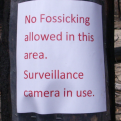
.thumb.jpg.7af0585f202661f6e850a3900ea329e1.jpg)
